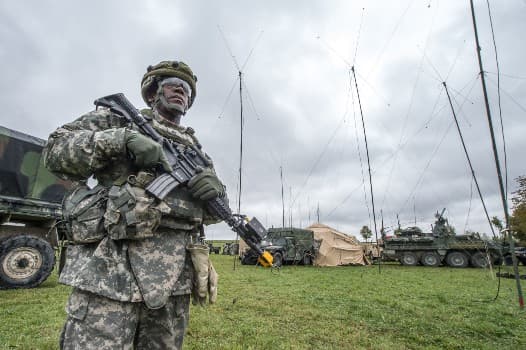US Congress moves to block Trump's withdrawal of troops from Germany

US lawmakers have announced a bill that would delay the withdrawal of US troops until after President Donald Trump has left office, thus opening a door to a reversal of a decision announced by Trump in the summer.
The National Defence Authorization Act (NDAA), which still needs to pass through the US Congress, specifies that a troop withdrawal can only happen 120 days after the defence secretary presents a report to Congress analysing whether the troop withdrawal is in the US national interest.
In June, President Trump announced plans to withdraw close to 12,000 of the 36,000 US troops based in Germany, citing Berlin’s failure to meet its NATO spending commitments.
As Trump is to leave office on January 20th, to be replaced by Democrat Joe Biden, the bill casts doubt on the entire troop withdrawal.
READ ALSO: Trump 'to withdraw thousands of US soldiers from Germany by end of 2020'
Trump still has the chance to veto the bill, something he indicated that he would do on Wednesday, although the objections he cited in a Twitter post did not reference the block on his troop withdrawal plans. A two thirds majority in Congress could then overturn his veto.
Section 230, which is a liability shielding gift from the U.S. to “Big Tech” (the only companies in America that have it - corporate welfare!), is a serious threat to our National Security & Election Integrity. Our Country can never be safe & secure if we allow it to stand.....
— Donald J. Trump (@realDonaldTrump) December 2, 2020
Trump's plans met with criticism from the US military top brass, as well as from his own Republican party. In Congress, both Democrats and Trump's Republicans announced their opposition to the plans.
The bill now states that Congress continues to value Germany as a strong NATO partner. The presence of the "approximately 34,500 members of the U.S. armed forces stationed in Germany" serves as an important deterrent against Russia's expansionist ambitions in Europe, it states.
The bill further states that the U.S. troops in Germany are of central importance for supporting U.S. missions in the Middle East, Africa and Afghanistan.
A few weeks after Trump's announcement, the now dismissed US Secretary of Defence Mark Esper made it clear that the plans were to be implemented "as quickly as possible". As yet though, there has been no troop reduction.
A good half of the 12,000 soldiers were to be recalled to the USA, while 5,600 were to be transferred to other NATO countries.
Three locations in Baden-Württemberg, Bavaria and Rhineland-Palatinate would be particularly hard hit by the plans: Stuttgart, Vilseck and Spangdahlem.
Comments
See Also
The National Defence Authorization Act (NDAA), which still needs to pass through the US Congress, specifies that a troop withdrawal can only happen 120 days after the defence secretary presents a report to Congress analysing whether the troop withdrawal is in the US national interest.
In June, President Trump announced plans to withdraw close to 12,000 of the 36,000 US troops based in Germany, citing Berlin’s failure to meet its NATO spending commitments.
As Trump is to leave office on January 20th, to be replaced by Democrat Joe Biden, the bill casts doubt on the entire troop withdrawal.
READ ALSO: Trump 'to withdraw thousands of US soldiers from Germany by end of 2020'
Trump still has the chance to veto the bill, something he indicated that he would do on Wednesday, although the objections he cited in a Twitter post did not reference the block on his troop withdrawal plans. A two thirds majority in Congress could then overturn his veto.
Section 230, which is a liability shielding gift from the U.S. to “Big Tech” (the only companies in America that have it - corporate welfare!), is a serious threat to our National Security & Election Integrity. Our Country can never be safe & secure if we allow it to stand.....
— Donald J. Trump (@realDonaldTrump) December 2, 2020
Trump's plans met with criticism from the US military top brass, as well as from his own Republican party. In Congress, both Democrats and Trump's Republicans announced their opposition to the plans.
The bill now states that Congress continues to value Germany as a strong NATO partner. The presence of the "approximately 34,500 members of the U.S. armed forces stationed in Germany" serves as an important deterrent against Russia's expansionist ambitions in Europe, it states.
The bill further states that the U.S. troops in Germany are of central importance for supporting U.S. missions in the Middle East, Africa and Afghanistan.
A few weeks after Trump's announcement, the now dismissed US Secretary of Defence Mark Esper made it clear that the plans were to be implemented "as quickly as possible". As yet though, there has been no troop reduction.
A good half of the 12,000 soldiers were to be recalled to the USA, while 5,600 were to be transferred to other NATO countries.
Three locations in Baden-Württemberg, Bavaria and Rhineland-Palatinate would be particularly hard hit by the plans: Stuttgart, Vilseck and Spangdahlem.
Join the conversation in our comments section below. Share your own views and experience and if you have a question or suggestion for our journalists then email us at [email protected].
Please keep comments civil, constructive and on topic – and make sure to read our terms of use before getting involved.
Please log in here to leave a comment.